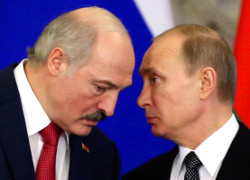Belarus is lodgement for attacking Baltic States and Poland
- 30.03.2015, 14:46
- 2,812

Poland's Gazeta Wyborcza published an article by Andrei Sannikov the leader of European Belarus civil campaign.
The G20 summit was held last November in Brisbane, Australia. The hosting party invited the world's main aggressor Vladimir Putin to attend the event. The decision was controversial, but the summit in Australia was held at the highest level. The G7 inside the G20 demonstrated its unity, decisiveness, consistency and strength to Putin. Russia's aggression against Ukraine wasn't condemned with such unity before or after the Brisbane summit. For a couple of days after endless warnings, talks and red lines, the West showed its real power and readiness to defend its values, 2010 presidential candidate and former political prisoner Andrei Sannikov wrote for Poland's leading newspaper Gazeta Wyborcza.
Putin had big plans for Australia. He counted to get a package agreement on Ukraine in his favour by using the presence of his potential allies – the BRICS members, Mexico, Argentina and Turkey. He wanted to raise the question of the “federalisation” of Ukraine, i.e. its disintegration and, perhaps, to reach some agreements on the partition of Ukraine.
More than cold reception in Brisbane demonstrated by the world's leaders, strong condemns of Russia's aggression, direct demands to “get out of Ukraine” and a firm intention to impose sanctions shocked Putin. His plans were ruined, and his potential allies, seeing the West's decisiveness, didn't dare to even physically approach the Russian president.
It's a mystery what happens to the G7 and EU leaders after the Brisbane summit. Instead of decisive actions, they again began to speak about “another chance” for the Kremlin's leaders and new talks with the aggressor. It ended with Minsk in March and the expected failure of the talks.
Minsk became Putin's revanche for Brisbane. He thoroughly prepared, carefully thought out and effectively implemented it. Putin needed Germany's Chancellor Merkel and a meeting with her in his territory (he considers Lukashenka's palace in Minsk to be his territory). It was clear that the choice of the place determines the content and goals of Putin's meeting with Merkel, Hollande and Poroshenko: to achieve the neutralisation of the Brisbane effect, confuse the West in lies to delay sanctions, get a respite, regroup and continue the attack on Ukraine's east. And he achieved it.
The direct consequence of the Minsk talks was the seizure of big railway centre Debaltseve by separatists and the continuation of all-treatment of Ukrainian pilot Nadia Savchenko in Russian jail, whom the parties allegedly agreed to free.
It's strange that the EU leaders did not understand the danger of Minsk for the West and Ukraine. It's strange that Europe continues to welcome Lukashenka as a mediator in the talks on Ukraine even after it became clear that the Minsk night would not end with sunrise for Ukraine. Moreover, Europe organised a tourist route to Minsk give a bow to Lukashenka, and even the US took part in it.
The West tries to regard dictator Lukashenko as “lesser evil”, but it does not understand that both the Belarusian regime and the Kremlin have the same course and support each other. The nature of the regimes is the same. They both have roots in the Soviet Union and skilfully use the West's money to suppress all civil liberties.
The Soviet “evil empire” hasn't disappeared. The Soviet Union collapsed, but the evil it had sown grew and turned into the “cooperative of dictators” that settled down in the territory that denies democracy and enjoys violence, corruption, lies and disregard of people. This cooperative and society of dictatorships that support one another, where Lukashenka and Putin have leading roles, is far more scary and dangerous than the former Soviet empire.
Putin supports authoritarian and dictatorial regimes in former Soviet countries, does not allow any sprouts of democracy and helps suppress those that managed to grow. This is the support base for the Kremlin's ruler and resources for his aggression against Europe. That's why Putin started a war in Ukraine: one of the dictators, Yanukovych, failed to keep his power and the people of Ukraine made a breach in the fence of the “cooperative of dictators”. Yanukovych just didn't have enough time to create Lukashenka-style dictatorship in Ukraine. The people of Ukraine made their choice, and Putin responded with the war that threatened entire Europe. He defends his habitat and his dictators.
The West has tools to stop the war. The tools don't even include weapons supplies to Ukraine, though it has the right to receive them. The West has the arsenal of sanctions – political, economic, financial, information and personal ones. Consistency, decisiveness and regular strengthening of sanctions are needed. Sanctions for the protection of human rights and liberties should target all members of the “cooperative of dictators”, otherwise the threat to the international peace won't be removed and Ukraine won't be saved.
The EU's policy on values protection, which is not quite clear today, needs logic. It's hard to explain why Latvia is satisfied with the invitation of Lukashenka to the Eastern Partnership Summit in Riga scheduled for May 2015. He should not be there. No changes in the regime's policy have happened. On the contrary, repression has increased.
Brussels thinks Lukashenka's manoeuvrings in the issue of the Ukrainian war should be welcomed, but it forgets that the territory of Belarus is the Kremlin's natural lodgement for attacking the Baltic States and Poland, and it became possible only due to Lukashenka's regime.
The democratic world needs the spirit of Brisbane today. Germany, Europe's leader, came to democracy, security and prosperity after the defeat of fascism. Dictatorships, both big and small, must fall. This is a guarantee of Europe's security.
Otherwise “Ivanushki International” will visit Europe soon, and it won't be the music group popular in Russia in the 1990s.









